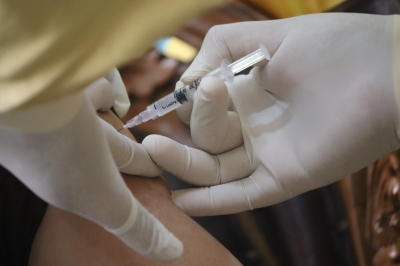This Christian medical doctor says get the COVID vaccine

Editor's Note: This is part three of a 3-part series about COVID-19 and its vaccine. You can read part 1 here and part 2 here.
Today, we still have a huge danger from this COVID-19 virus. I believe the vaccine is our best hope right now.
As a primary care physician for 40 years, I see myself as both a man of science and a man of faith. You could say I wear bifocals; I have a faith lens and a science lens and try to look at things from both sides.
In his opinion article recently, Pastor Mike Hayes talked about fear. I don’t fault people for having fear. But fear is a terrible master.
I often pray with patients, while respecting people’s own faith and beliefs. I also believe God has released information to this generation, which has been building up over several centuries. The scientific method provides a useful and constructive way to look at nature, biology, and evidence. Science has led to many advances and improved outcomes for people around the world.
Sometimes my patients have issues of doubt about medical science, and I work with them to help resolve those feelings. I can understand people who have a fear of science, because, in decades past, awful things have been done supposedly from a scientific basis.
We can even look at the Holocaust, where there was an outpouring of hatred and anti-Semitism based on a supposed theory of science—eugenics and the drive to “make a perfect race.” It was completely misguided and based on false information. Horrifying, unethical things were done in the name of “science” when not guided by a moral compass.
I believe the role of the church and faith includes developing a moral compass. Western civilization is based on the Bible and the tradition of faith. My wife, Virginia, and I have been intentional to show and teach our 11 children that faith is the most important part of your life.
And I’ve seen faith overcome fear. As a medical doctor, I try to go to where people are, take them by the hand, and walk with them through that journey.
Often I have young mothers come into my office with the little baby that God has given them in their arms. When they are resistant to vaccines, I ask them to consider the big picture.
In the year 1900, the average lifespan in America was about 47 years of age. In 2000, it was 77. We gained 30 years of life expectancy in one century, which is unheard of in the history of mankind. Half of those gains can be attributed to vaccines against smallpox, polio, measles, mumps, rubella, diphtheria, tetanus, pertussis, and rotavirus, among others.
When I was in medical school and then as a resident, we often had three or four people die at our local hospital every year from Haemophilus influenza. Many people don’t even remember that name. A vaccine developed in the 1980s basically eliminated that disease from society.
The development of vaccines has improved though it’s not perfect. For instance, the flu vaccine that we give changes from year to year because of the mutations of the influenza virus, and it’s only usually about 40 or 50 percent effective in reducing severe cases, hospitalizations, and deaths.
Today, evidence indicates the vaccines we have now against this coronavirus are over 90 percent effective. Last summer, prior to the vaccines being available, I contracted COVID-19 though I didn’t have any symptoms. Following that asymptomatic case of corona, I did have antibodies for a brief time. Now I have received both doses of one of the mRNA vaccines and did not have any reaction to either shot.
For a few people, the COVID vaccines have had minimal side effects—quite low compared to other vaccines developed for rare diseases. When you get a vaccine against yellow fever, for instance, you can get quite sick. That’s not the case with these COVID vaccines for most people.
I’ve encountered very few of my patients where we seriously consider whether an adverse reaction from the COVID vaccine would be a greater risk than the virus. Usually, they are immunocompromised. One of my patients has Guillain-Barré Syndrome, a rare autoimmune disorder, and a past vaccination led to an adverse reaction from which she recovered.
In such rare cases, for those who cannot receive the COVID vaccine, it helps protect them from this deadly coronavirus when the rest of us are vaccinated against COVID-19.
It’s really miraculous that, in a short period of time, medical science was able to develop these vaccines and have them be so effective in this situation. The adverse reactions have been very minimal. We have to try to stop this deadly coronavirus. Our hope is that we get to a place where the virus levels go way down. These vaccines have become our best tool in that fight.
In my medical opinion, getting the vaccine is the safest way to go.
Tim Shepherd, M.D., has been a family practice physician in the Dallas area for over 40 years.



























